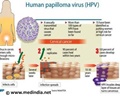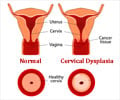
‘Women should continue screening for cervical cancer as they age 65.’
Tweet it Now
A recent study published in the American Journal of Preventive Medicine, found that the incidence rate of cervical cancer may not decline until the age of 85 years for women without hysterectomy and that women over 65 who have not been screened may benefit from continued surveillance."An older woman who has not had her cervix surgically removed has the same or even higher risk of developing cervical cancer compared to a younger woman," said lead investigator Mary C. White, ScD, Chief of the Epidemiology and Applied Research Branch, Division of Cancer Prevention and Control, Centers for Disease Control and Prevention (CDC), Atlanta, GA. "Women who have not had a hysterectomy need to continue to be screened until age 65, and possibly later if they have not been screened for many years or are at special risk, consistent with current U.S. Preventive Services Task Force recommendations."
In 2013, one-fifth of cervical cancer cases and one-third of cervical cancer deaths occurred among women 65 years of age and older. Current recommendations say that screening can be stopped at age 65 if an adequate testing history indicates consistently negative results. Three consecutive negative cytology results or two consecutive negative co-test results within the last 10 years, with the most recent test within the last 5 years, are considered sufficient reason to stop screening average risk women after age 65.
Using data from the 2013 and 2015 National Health Interview Survey (NHIS), investigators looked at the use of screening tests and rates of cervical cancer for women 65 years of age and older. They found that when corrected for hysterectomy, incidence rates of cervical cancer increased with age until 70 and did not begin to decline until age 85.
The data also revealed that many women approaching the "stopping" age of 65 were not getting sufficient screening. Researchers established that the proportion of women not recently screened increases with age. While only 12% of women in their 40s had no recent screening history, that number progressively increased for women in their 50s and 60s. Nearly 850,000 women aged 61-65 years had not been screened within the last five years.
Advertisement
Cervical cancer can affect women of all ages. This new study highlights the importance of regular screening for older women who are at high risk or without documentation of adequate prior screening in order to help prevent cervical cancer deaths. Going forward, given increases in life expectancy and the high rates of cervical cancer after 65, women in midlife need to continue with routine cervical cancer screening to look for changes that may need further follow-up.
Advertisement
Source-Eurekalert















